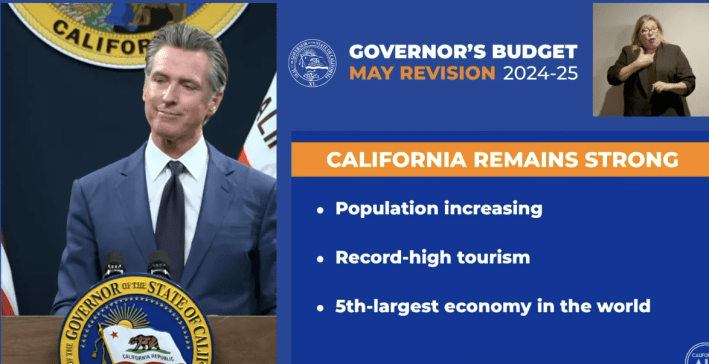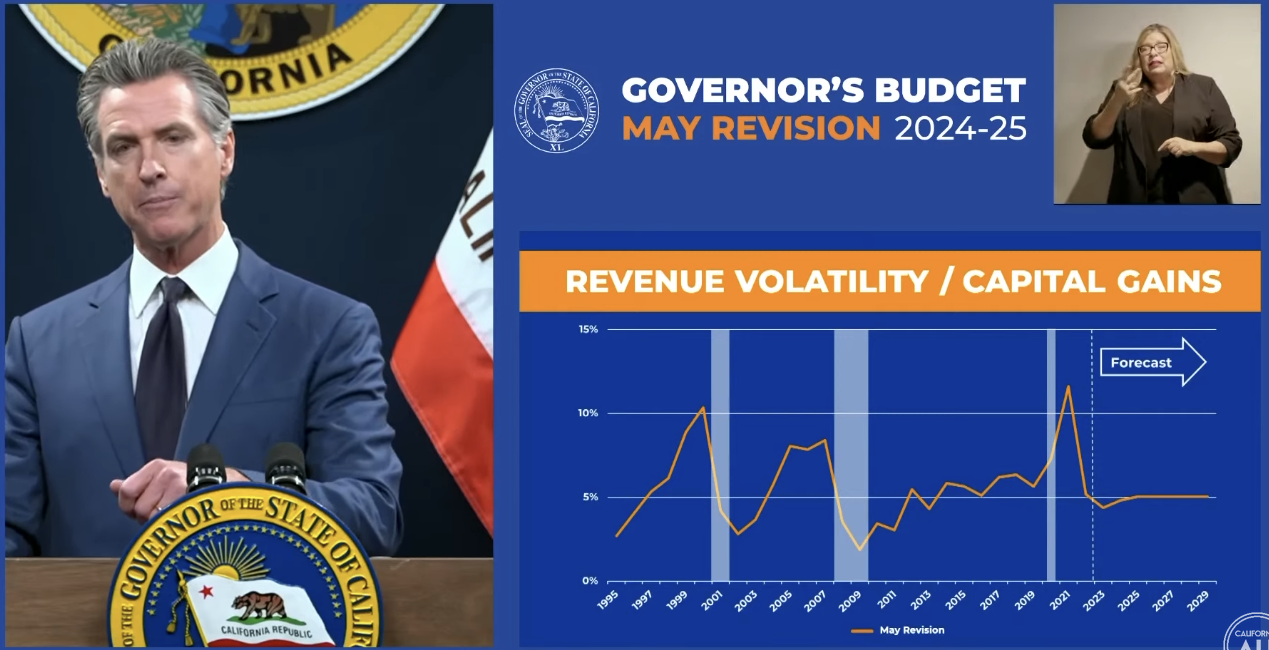Saying he had "largely preserved climate investments," Governor Newsom issued his May Revise for the state budget today. While details were sparse - his office issued an 8-page summary, with "details to come" - one thing he definitely preserved was a cut to the Active Transportation Program that he had proposed in January.
The California Bicycle Coalition points out that these cuts are not even necessary. That is, while the general fund has been subject to volatile ups and downs and is currently in a deficit, the state transportation budget has plenty of money. Not only is the gas tax a slightly steadier stream of revenue than the income tax revenue the general fund relies on, but new federal sources of money from the federal infrastructure bill are starting to arrive.
Governor Newsom said his revised budget proposal will "preserving core services in education, housing, health care, and food assistance." But it does so by delaying some programs and program expansions, tightening budgets, and tapping into state reserves.
"I feel strongly that we have to live within our means, and be more efficient," said Newsom.
Because the size of the state budget - and its volatility - depends on tax collection, reporters peppered the Governor with questions about whether he plans to raise taxes. His answer was an unequivocal "No. We can do what we need to do without raising taxes."
The "May Revise" is the governor's revision of his January budget proposal, and another step in continuing budget negotiations with the legislature. A budget must be signed by June 15, although some details will remain to be ironed out in "budget trailer bills" that can stretch negotiations through the summer.
Climate
Newsom said his proposal is "able to substantially protect climate commitments," and that the state will receive "an additional $15.9 million from the feds to enhance our climate budget."
However, as stated above, it includes a deep cut to the Active Transportation Program, which is the only transportation program to be cut. In fact, it increases the proposed cut from $200 million to $600 million, despite the aforementioned large transportation budget. The cut amounts to eliminating a two-year cycle of funding for bicycle and pedestrian infrastructure, which is a critical and unappreciated part of the state's climate crisis fight.
CalBike "calls on the legislature to reverse this cut to the Active Transportation Program" and to backfill the program's funding from the State Highway Account, according to their statement in response to Newsom's proposal.
Other climate advocacy groups responded with caution and concern to the Governor's proposals to shift program funding to future years. California "still faces an unfortunate reality: the climate crisis doesn’t take a break for tough budget years, and neither can we. Anything we put off for later will only cost us more and run up the bill we will have to pay as the climate crisis worsens," wrote NextGen California’s Climate 100 Project in a statement. It continues:
Climate change touches every part of the state, and every part of the state budget should take it into account. We can not just rely on one-time funding surpluses to address this crisis.
This budget situation illustrates the importance of taking an all-of-government approach to fighting the climate crisis and meeting our state’s climate targets in the final budget. To fall short of California’s Climate Commitment is substituting science fiction for reality - later is too late.
We need to fully fund the California Climate Commitment as soon as revenues rebound, and immediately start aligning other areas of the budget with the integrity of our California Climate Commitment. For example, we need to align expenditures in the State Highway Account to build for our future as a state instead of continuing to resurface 20th Century pave-the-earth programs on autopilot. And borrowing from the limited Cap-and-Trade funds in this budget creates larger future debts to repay.
But groups also expressed appreciation for Newsom's commitment to funding for new corporate climate accountability laws S.B. 253 and 261. These "are already catalyzing global change and innovation as multinational companies prepare to measure and disclose their total climate emissions for the first time ever," noted California Environmental Voters in a statement. And:
Our leaders are facing unprecedented decisions that will have real consequences for Californians. We won’t be able to protect communities now or in the future without sustainable and ongoing funding to transition to clean energy and create resilient communities and landscapes. The Governor and Legislature have a tough road ahead in the next month. Cutting corporate handouts and committing to a climate bond should be a given right now.
Public Transportation
Transit advocates were relieved and grateful to find that the Governor proposes maintaining the $5.1 billion that had already been approved to support public transportation. "The preservation of the total funding level, however, comes with funding shifts and delays, and we will be working closely with transit agencies across the state over the coming days to understand more fully the impacts these changes could have on transit-reliant riders and communities," wrote Michael Pimentel of the California Transit Association.
The CTA statement repeats a request that the governor immediately release promised funding that was suddenly and unexpectedly frozen on April 30, imposing "significant uncertainty around billions of dollars in one-time federal funding, project delivery timelines, and operations planning.”
There are separate ongoing discussions in Sacramento around proposals for bond measures on climate, housing, and schools. Newsom refused to say anything more about those, other than that "those conversations continue."







